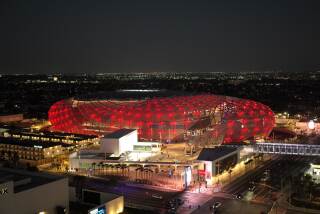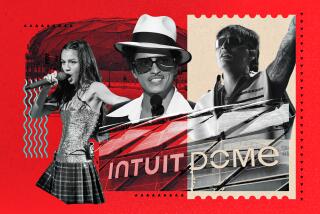Blue Palm’s Bicultural Steam
Burns and Allen. Nichols and May. Lucy and Desi. The list of American funny couples is a short one, and it’s not likely to get much longer in these days of short-run romance and solo shtick.
Yet there’s always room for one more--pair, that is. Enter Tom Crocker and Jackie Planeix, a husband-and-wife performing duo who go by the name of Blue Palm.
As iconoclastic as they are counter-cyclical, Crocker and Planeix are dual-citizen residents of Paris and L.A. They first made their mark on Los Angeles’ performance scene in the late 1980s, with shows combining dance, theater and comedy in a winsome signature style.
These days, however, the former Bejart soloists--who recently returned from a stay in France--are leaning more heavily on the pen than the barre, with a dance-sprinkled social satire performed in sketch-comedy format. Blue Palm’s new show, “Folie a Deux” (Shared Madness), opens at LunaPark on Saturday.
The piece reflects both the couple’s biculturalism and their artistic trajectory over the past decade. They have gone from being dancers who use words to writers who use dance.
The change, they say, has everything to do with the places in which they’ve lived. “We do reflect our environment,” says Planeix, seated at the kitchen table of the hillside Silver Lake house where the couple have lived since moving here nearly 10 years ago.
“Here what we do is sit and talk and try to figure how other people live, what happens to other people’s lives--because they looked stunned most of the time. Then we retranspose that into our satires of intimacy and relationships.”
Their work at LunaPark is about “people whose relationships to their bodies are different than that which we used to have to our bodies,” adds Crocker, as he stands in an airy kitchen filled with signs of the couple’s 3-year-old daughter, Madeleine.
“Our body was our physical expression, and the text aspect was more scattershot,” he continues. “Our stuff is more scripted now. This is a bodyless form.”
Crocker, who grew up in the Bay Area, and Planeix, who was raised in France and the United States, met in Brussels at the multidisciplinary MUDRA Arts Institute, directed by French choreographer Maurice Bejart. They went on to perform and tour the world as soloists with Bejart’s acclaimed Ballet of the 20th Century.
Feeling constrained by the world of dance--and wanting to collaborate with each other--Crocker and Planeix founded Blue Palm in the mid-1980s. The dance-text mix of “Dance Talks!” and other shows was seen at such noted venues as the Georges Pompidou Center in Paris and the Grand Thea^tre de Geneve in Switzerland.
This work also was quick to bring praise in L.A.--in part because their move was well-timed to catch a particularly flourishing moment in the performance-art scene.
“When we came here, there were a fair amount of people who were doing more personalized work,” Planeix said. “France, for all the wonderful things we have to say about it, and despite the critical acclaim [we had there], didn’t know where to put us.”
Still, there was culture shock involved in going from, as Crocker puts it, “Pina Bausch and taking showers in the cellar of the Vienna Opera House” to the capital of pop culture and entertainment--L.A.
“That transition took us a while,” Crocker says. “When we came here, we were jumping around spewing French-English stuff. Then you settle in to learn the lay of the land. We started writing, and dancing less.”
The change is not wholly attributable to the move West, however. “We were traveling in that direction,” Planeix says. “We were mid-journey. Obviously, when we were in dance companies, we were exclusively dancing. And in our shows ‘Dance Talks!’ and ‘Amour,’ we were dancing with words. It was very physical. And now it’s much more static.”
The couple also experienced a change in artistic identity. “I can relate it also to our sense of ourselves,” Planeix says. “We went from wanting to express a physical being and being very involved in the act of performance, to wanting to express something that is more inside.”
Adds Crocker: “Now the gaze is more outward. We’re still looking for meaning and truth in the idiosyncratic or insane behavior of people. Even if we make light of it, it’s still our search for truth and understanding.”
The content that has piqued their interest is, and has long been, human relationships--and the ways in which those interactions differ in their two home cities.
Not surprisingly, L.A. men and women have proven more difficult to get to know than their Parisian counterparts. “Here in America, we’re basically trying to be perfect people,” Crocker says. “There’s a smooth factor which gets you through.”
Planeix agrees. “Here, everybody’s sweet, everybody’s nice. It’s easy to like everybody. But people are very guarded ultimately. They know what they want to say, and that’s all you’re going to get.”
That, of course, makes Blue Palm’s task all the more challenging. “You have to ask yourself why you like these people, and the task of creating empathy is a very human one and a very stimulating one,” Planeix says.
Then again, it can also make the cafes and dinner parties of the City of Light look all the more attractive. “Strangely enough, this last visit provoked us to want to do more back and forth,” Crocker says. “We go through ins and outs in terms of our French identity, but this last visit rekindled the desire.”
* “Folie a Deux,” LunaPark, 665 N. Robertson Blvd., West Hollywood. Saturdays, 8 p.m. $8. Closes Aug. 23. (310) 652-0611.
More to Read
The biggest entertainment stories
Get our big stories about Hollywood, film, television, music, arts, culture and more right in your inbox as soon as they publish.
You may occasionally receive promotional content from the Los Angeles Times.










